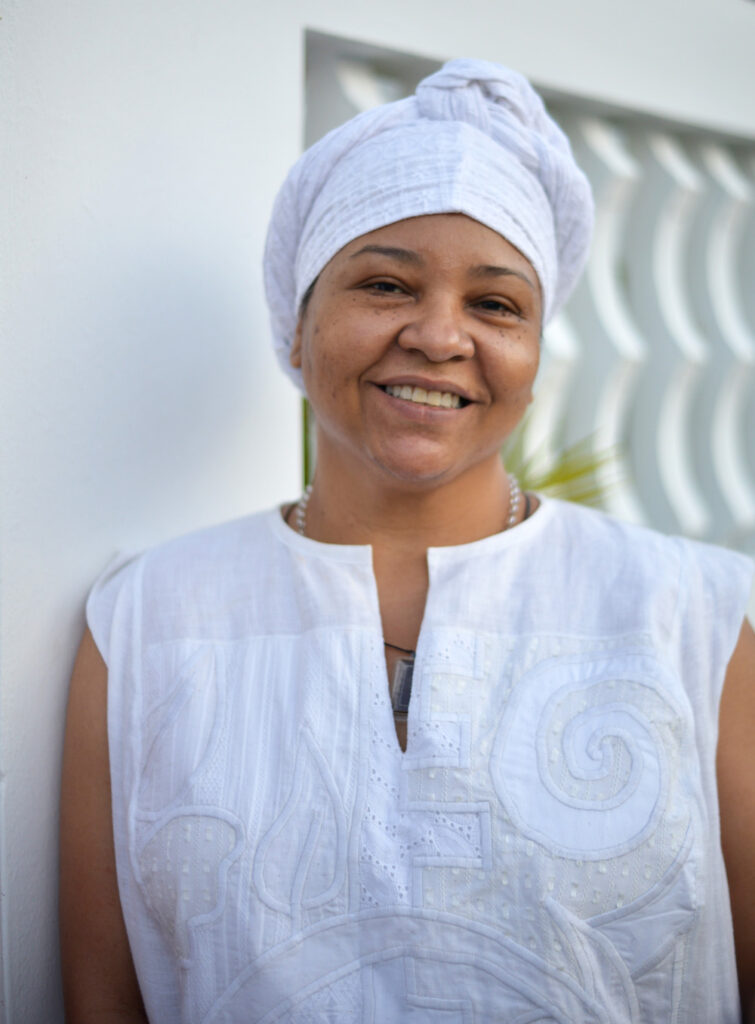Lisa Allen- Agostini’s domestic noir is heart wrenching and redemptive
By Kimberly Wallace, HER Magazine

Excitement around Lisa Allen-Agostini’s The Bread the Devil Knead reached fever pitch when news broke on social media that British actress Naomi Harris will read an extract from the novel at the Women’s Prize virtual event on June 15.
It was the latest good news in what has been an exceptionally good year for the writer, editor and stand-up comedian. Since the release of the novel last May it was longlisted, then shortlisted for the 2022 Women’s Prize for Fiction and has enjoyed wide acclaim.
Four years following the release of the Young Adult novel Home Home which earned Allen-Agostini the CODE Burt Award for Caribbean Young Adult Literature, the writer has proven once again why she is undoubtedly one of the most notable female authors on the Caribbean literary landscape.
Allen-Agostini is a true chameleon, with more than two decades of writing under her belt. She has penned everything from newspaper articles, academic papers, romantic fiction, children’s stories and young adult fiction. Even in her other incarnations as a stand-up comedian and filmmaker, she’s written for the stage and screen.
But it’s her latest offering and first adult novel, The Bread the Devil Knead – published by Myriad Editions – that has everyone talking. It was all the motivation we needed to catch up with the author and poet early one midweek morning. During our interview – one of many she’s done since the book was released, Allen-Agostini opened up about the novel and its importance – especially in the stream of time we’re living in, where our society has been forced to reckon with the worsening plague of domestic and sexual abuse. She also reflected on the lucky break that opened the doors to her writing career.
Neither Allen-Agostini nor the other shortlisted novelists have been nominated for the Women’s Prize for Fiction shortlist before. The novel’s success doesn’t come as a surprise for the writer.
‘The book is God’s work, His will be done,’ she says.
The plot for The Bread the Devil Knead wasn’t percolating in Allen-Agostini’s brain waiting to find a home on paper. Rather it emerged from a piece she began writing years ago as she sat in a coffee house in MovieTowne staring out at the carpark. At that time her thoughts conjured a disturbing scene of a woman lying in a hospital bed nursing serious injuries following a dustbin bomb explosion in Port of Spain.
The attack subsequently triggered flashbacks of painful memories that had been lying in ambush in her subconscious. Allen-Agostini’s piece, once completed, struggled to find resonance. One editor found the storyline unrealistic, even though dustbin attacks in the heart of Port of Spain were an actual fact and not a figment of her imagination. Nevertheless, she continued to develop the story, while honing her skills in a writing workshop founded by the late poet and essayist Wayne Brown. With some rewrites and edits, it eventually took the shape of the novel critics are now calling ‘fantastic’, ‘extraordinary and emotionally immersive’.
The Bread the Devil Knead tells the story of fashionable and independent Alethea Lopez who is the victim of domestic abuse and seeks solace in an affair with her boss. When Alethea sees a woman shot dead by her jealous lover in front of her store in broad daylight, the reality of what awaits her hits home.
The novel which is both heart wrenching and redemptive is everything one would expect from Allen-Agostini who tells it like it is in interviews and in her writing. The Bread the Devil Knead is considered ‘domestic noir’ and for good reason;it explores difficult topics which we in the Caribbean and here in T& T are all too familiar with: domestic violence and sexual abuse. Allen-Agostini’s writing is a reflection of who she is – frank and honest.
She has been very forthcoming about growing up in Morvant in a house with no running water, marrying early and having children early. She is not one to avoid wading into the depths of uncomfortable subjects; rather, she has used her writer’s pen to lift the veil on issues that were otherwise swept under the carpet. “I write about difficult topics. Period. It’s kind of what I do,’ says the writer, who drew reference to her newspaper columns on children’s rights and child sexual abuse as well as her novel Home Home, a story of a dark-skinned black girl from south who has an undiagnosed mental health condition and attempts suicide. Her mother sends her away to family ‘to recover’ but it’s really because she’s ashamed and like many parents, she thinks the idea of mental illness is ridiculous and self-indulgent.
In The Bread the Devil Knead, Allen-Agostini doesn’t whitewash the realities that happen behind several closed doors – namely domestic abuse and incest and the intergenerational violence that trap persons in the cycle of abuse.’I am a survivor of child sexual abuse myself so I am happy that the book can be like a platform where people can talk about how we respond to our children, how we keep our children safe and also the repercussions of child sexual abuse.
Years ago I wrote a column in the Guardian about a lot of these young people – boys and girls behaving in ways we describe as ‘hot-up’ or ‘fresh’, but it’s really in response to abuse,’ she says. ‘When I write, I don’t necessarily try to shield anyone or write in a way that is palatable. I just write what I see or know to be true and I try to make beautiful sentences – that’s the honest truth.’
Most of the novel is written in Trinidad Creole; she often alternates between Standard English and Trini Creole in her writing. Her weekly column in the Guardian which ran from 2006-2010 was written in Trinidad Creole. As important as the story itself, is ensuring that the language used is appropriate to the story, she says.

‘I primarily tell stories for us and to us. They’re our stories and stories that I would like us to know about and read; and by ‘us’ I mean Caribbean people. But I also try to write in a way so that anybody can understand it and read it. And one of the choices I’ve made with my representation of creole on the page is to use Standard English spelling, but when you read it in context you understand that it’s a Trinidad creole usage.’
The book’s main character Alethea sees the world, ‘meets all kinds of people, learns all kinds of words, and lives all kinds of lives’, by reading books.
‘Thank God for books,’ says Alethea in the novel’s opening chapter.
A love for the written word is a common thread that links both author and protagonist. Growing up, Allen-Agostini was a voracious reader; books like the classic To Kill a Mockingbird, Khalid Hoseini’s unforgettable debut The Kite Runner and The Shipping News by Annie Proulx, still occupy a place on her book shelf at home. At the age of six she had already decided that not only did she want to read stories, she wanted to write them too – especially poetry.
Ask any schoolteacher, student or anyone Allen-Agostini has known on a significant level and they will all agree that she was always a writer. She began acting with the Trinidad Theatre Workshop and studied stagecraft and literature at The University of the West Indies and also earned her BA in Literatures in English (first class honours). Wayne Brown was among the first to identify her obvious talent for writing after he read her self published collection of poetry Something to Say. He invited her to take part in The Creative Writing Workshop of which he was founder and tutor but at the time she was a young mother, newlywed – and broke. Doing the workshop wasn’t in her realm of possibilities.
It was the Caribbean romance novel Tigress, written by another Caribbean writer Valerie Belgrave that opened the door to her writing and journalism career. Allen-Agostini was a student at The UWI when she picked up the book for the first time. ‘I found the book fascinating because it was the first time I had seen a family like my own in print,” she recalls.
Belgrave caught wind of how much Allen-Agostini enjoyed the book and invited her to write a review on Tigress, which was read at the book launch. The late Express editor Keith Smith got his hands on the review and told veteran journalist and columnist Lennox Grant ‘get this girl to come write for the Express’.
Allen-Agostini was in her early 20s when was called in for an interview and began her career in journalism as a feature writer. Years after she first declined Brown’s invitation to do his writing workshop, the opportunity arose again when The UWI introduced a Master of Fine Arts in Creative Writing. She couldn’t afford to do both, so she chose Brown’s workshop.
Several projects on and off the stage followed, she wrote the science-fiction YA novel The Chalice Project, then Home Home. Allen-Agostini credits journalism for helping her develop a keen eye for research, which is proving to be especially useful now that she is working on another novel with a backdrop set in music- pan to be exact.
The plot is only hers to tell and when that time comes, one can be sure that it will be worth the wait.
The winner of the Women’s Prize for Fiction 2022 will be announced on June 15. The Bread The Devid Knead is available on Amazon and at Paper Based Bookshop.
